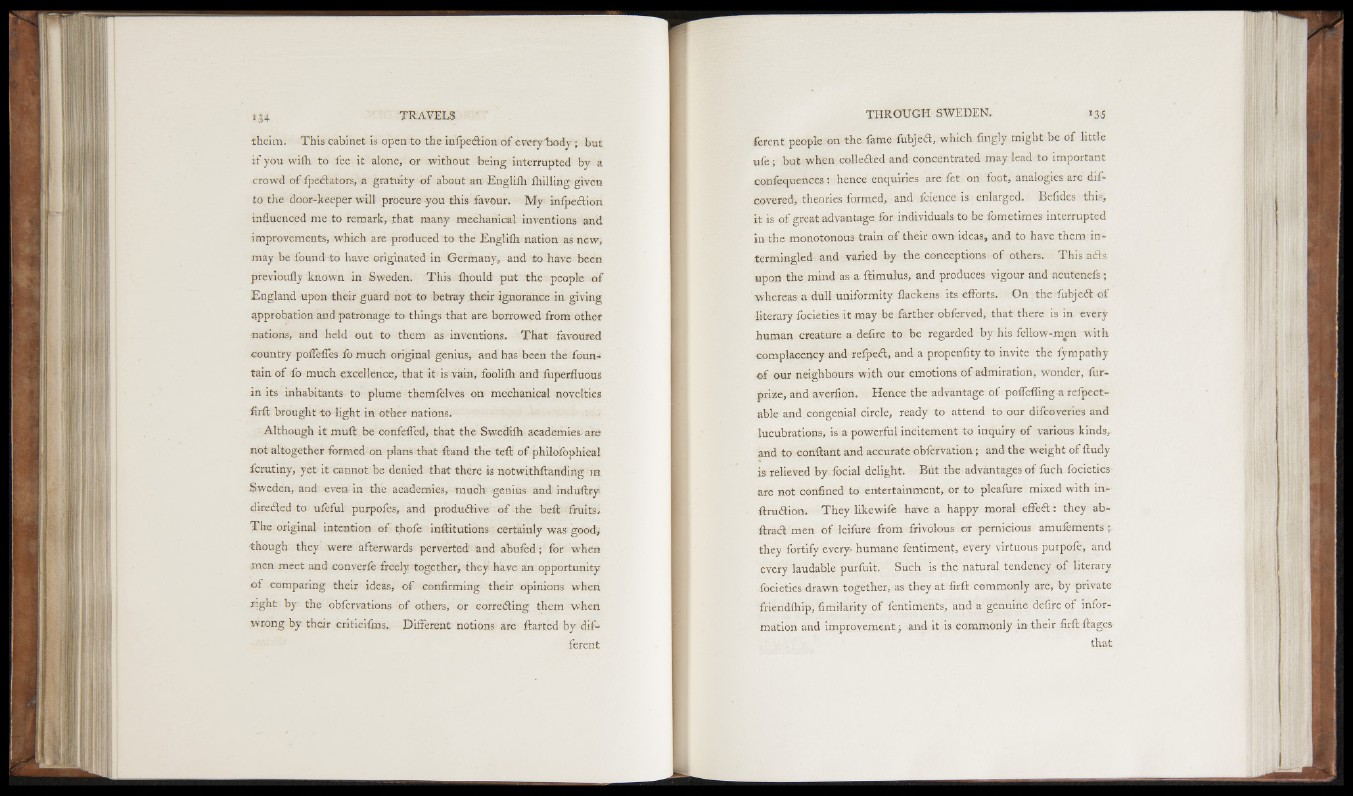
iheim. This cabinet is open to the iofpection o f every b o d y ; but
i f you wiih to fee it alone, or without being interrupted by a
crowd o f fpeftators, a gratuity o f about an Engliih iliilling given
to the door-keeper will procure you this favour. My inflection
influenced me to remark, that many mechanical inventions and
improvements, which are produced to the Engliih nation as new,
may be found to have originated in Germany, and to have been
previoufly known in Sweden. This ihould put the people o f
England upon their guard not to betray their ignorance in giving
approbation and patronage to things that are borrowed from other
nations, and held out to them as inventions. T h a t favoured
country pofleffes lb much original genius, and has been the fountain
o f fo much excellence, that it is vain, foolilh and fuperfluous
in its inhabitants to plume themfelves on mechanical novelties
firft brought to light in other nations.
Although it mult be confefled, that the Swediih academies- are
not altogether formed on plans that Hand the tell o f philofophical
fcrutiny, yet it cannot be denied that there is notwithftanding in
Sweden, and even in the academies, much 'genius and induftry
direfted to ufeful purpofes, and productive o f the belt fruits.
The original intention o f thofe inflitutions certainly was good,
though they were afterwards perverted and abufed; for when
men meet and converfe freely together, they have an opportunity
o f comparing their ideas, o f confirming their opinions when
right by the obfervations o f others, or correfting them when
wrong by their criticifms. Different notions are liarted by different
ferent people on the fame fubjeft, which fingly might be o f little
ufe; but when collected and concentrated may lead to important
confequences: hence enquiries are fet on foot, analogies are discovered,
theories formed, and fcience is enlarged. Befides this,
it is o f great advantage for individuals to be fometimes interrupted
in the monotonous train o f their own ideas, and to have them in termingled
and varied by the conceptions o f others. This aits
upon the mind as a itimulus, and produces vigour and acutenefs;
whereas a dull uniformity llackens its efforts. On the fubjeft of
literary focieties it may be farther obferved, that there is in every
human creature a defire to be regarded by his fellow-men with
complacency and refpeft, and a propenfity to invite the fympathy
o f our neighbours with our emotions o f admiration, wonder, fur-
prize, and averfion. Hence the advantage o f poflefling a refpect-
able and congenial circle, ready to attend to our difcoveries and
lucubrations, is a powerful incitement to inquiry o f various kinds,
and to conftant and accurate obfervation; and the weight o f lludy
is relieved by focial delight. But the advantages o f fuch focieties
are not confined to entertainment, or to pleafure mixed with in-
Itruftion. T he y likewife have a happy moral e ffe ft: they ab-
Itract men o f leifure from frivolous or pernicious amufements
they fortify every, humane fentiment, every virtuous purpofe, and
every laudable purfuit. Such is the natural tendency o f literary
focieties drawn together, as they at firft commonly are, by private
friendfhip, fimilarity o f fentiments, and a genuine defire o f information
and improvement; and it is commonly in their firft ftages
that